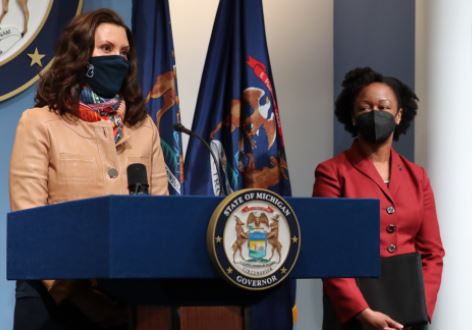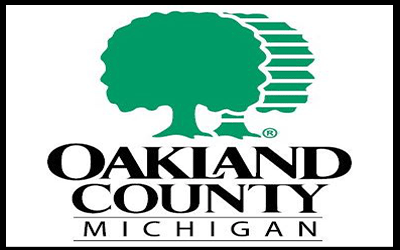
Whitmer Update on the COVID-19 Pandemic

|


|
 |
|||||||
– DNR News – |
|||||||
|

“Oakland County has a quality of life that endures because of its 1,450 lakes, 138 miles of trails, 90,000 acres of parks, and headwaters of five watersheds that flow throughout Southeast Michigan,” Coulter said. “We have a responsibility to address climate change so future generations can enjoy better public health, a stronger economy, and our beautiful natural resources.”
Through a competitive bidding process, Oakland County has selected AECOM to cultivate the sustainability plan. The company has led the development of over 30 city and county resilience plans around the globe. It will team up with Thomas Consulting Group and Eminence Partners to assist in this large and comprehensive project.
“The primary goals of this plan are to assess where Oakland County is in our environmental sustainability efforts and focus on areas of improvement and resources,” Deputy County Executive April Lynch said. “The focus will include ensuring we have a strong plan moving forward that can be in tandem with our capital improvement planning and adjustments in our operations.”
The sustainability plan will focus on four areas: campus operations, emissions and energy, nature and ecosystems, and health and well-being. A parallel goal will be to help local communities as they develop their own plans to protect the environment.
To oversee the creation and implementation of Oakland County’s sustainability plan, county executive administration has asked the board of commissioners to use a vacated position for the chief sustainability officer. This person will serve as a strategic advisor to the county executive on environmental sustainability initiatives, develop the county’s sustainability initiatives, and lead the countywide climate action plan. The base pay will be $129,817.
“We are committed to addressing climate change, and these actions show that the board and county executive are moving swiftly to protect our environment,” Commissioner Gwen Markham of Novi said. “The new sustainability officer will bring together all aspects of sustainability across our parks, operations and future planning, and the energy audit and sustainability plan will deliver changes we can make to reduce the county campus’s carbon footprint.”
“The creation of the chief sustainability officer position is critical and will be an important new role at the county,” Commissioner Kristen Nelson of Waterford said. “Having a green initiative expert join our team is a bold step forward in our commitment to climate protection, and it is key to executing Oakland County’s sustainability initiatives and countywide climate action plan.”
The sustainability plan will begin in April of 2021 with background research, stakeholder engagement, and a sustainability asset management study. The county expects to have the final sustainability plan developed by spring of 2022. The total cost to create the plan is $575,000.
Board of Commissioner committees have approved the county sustainability plan and the chief sustainability officer position. The full board will vote on both on Thursday, March 25.
FOR IMMEDIATE RELEASE
March 8, 2021
Contact: Lynn Sutfin, 517-241-2112
LANSING, Mich. – The first Michigan case of the COVID-19 variant B.1.351 was identified in a male child living in Jackson County by the Michigan Department of Health and Human Services (MDHHS) Bureau of Laboratories today. Case investigation is currently underway to determine close contacts and if there are additional cases associated with this case.
Originally detected in early October 2020 in South Africa, B.1.351 shares some mutations with B.1.1.7. Cases caused by this variant were reported in the United States at the end of January 2021. B.1.351 is believed to be more contagious, but there has been no indication that it affects the clinical outcomes or disease severity compared to the SARS-CoV-2 virus that has been circulating across the United States for months. Scientists are still evaluating how well COVID-19 vaccines work against this new variant.
However, a higher rate of transmission could increase the number of people who need to be hospitalized or who lose their lives to COVID-19 should the new variant begin circulating widely in Michigan. To date, the virus has been identified in at least 20 other states and jurisdictions in the U.S. This is the only known case in Michigan at this time, however it is possible that there are more that have not been identified.
“We are concerned about the discovery of another variant in Michigan, although it was not unexpected,” said Dr. Joneigh Khaldun, chief medical executive and chief deputy for health at MDHHS. “We continue to urge Michiganders to follow a research-based approach by wearing their masks properly, socially distancing, avoiding crowds, washing their hands often, and making a plan to get the safe and effective COVID-19 vaccine once it is their turn. We all have a personal responsibility to slow the spread of COVID-19 and end this pandemic as quickly as possible.”
Based on available evidence, current tests can identify COVID-19 in these cases. The available COVID-19 vaccines also work against this new variant. Protective actions that prevent the spread of COVID-19 will also prevent the spread of both identified variants in Michigan, B.1.1.7 and B.1.351. Michiganders should:
Viruses constantly change through mutation, and new variants of a virus are expected to occur over time. MDHHS’s Bureau of Laboratories is a national leader in whole genome sequencing for SARS-CoV-2. MDHHS identified the variant in this individual’s sample and will continue to conduct whole genome sequencing to quickly identify any variants of interest, including B.1.351.
Whole genome sequencing allows scientists to examine the genetic material of pathogens, including SARS-CoV-2. Over the past 10 months, laboratories across Michigan have been submitting samples to the state public health laboratory for surveillance to help monitor the emergence of any variants of concern. MDHHS Bureau of Laboratories prioritizes additional specimens for whole genome sequencing when there is increased concern for a new variant of the virus, such as in people with a travel history to places where the variant is known to be circulating.
As of March 8, Michigan has also identified 516 cases of the B.1.1.7 variant in 23 Michigan jurisdictions.
Information changes frequently regarding the outbreak and vaccine updates. For the most current information check with the Jackson County Health Department webpage located at Jackson County Health Department COVID vaccine webpage or check us out on our Facebook page. .
Jackson County vaccine updates are also available by calling the COVID Vaccine Information Line at 517-817-4469.
At this time, information is limited and changing rapidly. The latest information is available at Michigan.gov/Coronavirus and CDC.gov/Coronavirus.
Farmington Hills, Michigan – Farmington Hills resident, Korean War veteran and Marine Corps Medal of Honor recipient Robert Simanek, 90, is being further recognized for his bravery in combat by having a new U.S. Navy ship named in his honor.
Secretary of the Navy Kenneth J. Braithwaite recently announced the Expeditionary Sea Base USS Robert E. Simanek, has been ordered, noting it will carry on the Navy’s sacred mission to secure the sea lanes, stand by our allies, and protect the United States against all adversaries.
“Mr. Simanek, a long-time Oakland County resident, is the epitome of an American hero,” said Oakland County Executive David Coulter. “I’m in awe of his selfless act of bravery nearly 70 years ago and so happy for him and his family today. Not only did he receive the Medal of Honor for his valor, but now a Navy vessel with his namesake will be supporting Marines across the globe.”
This ship is currently scheduled to be completed in 2024. Weighing 100,000 tons when fully loaded, the USS Robert E. Simanek will perform a variety of missions, including launching helicopters, small boats, unmanned surface vehicles, special operations, troop transportation and maintenance services.
“I didn’t think having a ship named after me would happen,” Simanek said. “I was tickled to death when I found out about it.”
Simanek was a 22-year old Private 1st Class in 1952, when his squad was ambushed by Chinese troops. Already wounded by shrapnel, he threw himself onto a grenade to absorb the blast and save his fellow soldiers from injury or death. Somehow, he survived while sustaining serious leg wounds. After a nearly year-long recovery, he was awarded the Medal of Honor by President Dwight D. Eisenhower.
Simanek enlisted in the Marine Corps in 1951. He joined Company F, 2d Battalion, 5th Marines in 1952 as a rifleman and radioman when needed. The honor of having a ship named after him this year is but the latest recognition for service to his country. In addition to the Medal of Honor and Purple Heart, he also was awarded the Korean Service Medal with two bronze stars.


FOR IMMEDIATE RELEASE Gov. Whitmer Announces Expansion of MI Classroom Heroes COVID-19 Grants LANSING, Mich. – Gov. Gretchen Whitmer and State Treasurer Rachael Eubanks today announced the expansion of the MI Classroom Heroes COVID-19 Grants to include a new grant program for Great Start Readiness Program (GRSP), Head Start, adult education and young adult (ages 18-26) special education classroom teachers. “The MI Classroom Heroes COVID-19 Grants are just a small token of our gratitude to educators for going above and beyond during the pandemic,” Governor Whitmer said. “When COVID-19 hit, teachers worked around the clock to quickly transform from in-person teaching to remote instruction to ensure that their students could continue learning. It is simply the right thing to do to expand these grants to include all specific program teachers across the state.” The GRSP, Head Start, Adult Education and Young Adult Special Education Teacher COVID-19 Grant Program enables these specific program teachers to receive up to $500 for extra hours worked and costs incurred during the beginning of the COVID-19 pandemic last spring. A state budget appropriation signed by Governor Whitmer at the end of 2020 provides $2.5 million to make specific program teachers eligible to receive a MI Classroom Heroes COVID-19 Grant, who were not eligible under previous programs. “The Classroom Heroes COVID-19 Grants provide funds that our educators so richly deserve for their outstanding work during the pandemic,” said David Hecker, President of the American Federation of Teachers Michigan. “In addition to the money, these grants are a sincere showing of respect for our teachers and support staff, and what they do for Michigan’s students.”
Full-time and part-time GRSP, Head Start, adult education and young adult special education teachers in a school district or nonprofit nonpublic school classrooms during the 2019-2020 school year prior to moving to remote learning are eligible.
To receive up to $500, specific program teachers must have performed at least of 75% of their standard instruction workload in brick-and-mortar classrooms to moving to remote instruction on April 2, 2020.
“My staff has been working with school districts and other stakeholders to help ensure that all eligible teachers and support staff receive the MI Classroom Heroes Grants,” State Treasurer Eubanks said. “We will work urgently to ensure these specific program teachers receive their much-deserved grant payments.”
The state Treasury Department is working with the Michigan Department of Education, school entities and other education partners to implement MI Classroom Heroes COVID-19 Grants. Eligible specific program teachers should consult the school entity where they worked during the 2019-2020 school year to ensure they receive a grant.
Grant funding checks for the GRSP, Head Start, Adult Education and Young Adult Special Education Teacher COVID-19 Grant Program are anticipated to be sent directly from the state Treasury Department to teachers in June.
“Expanding the MI Classroom Heroes Grant to GSRP staff is a tremendous acknowledgement of the value of the work that they do every day,” said Scott Koenigsknecht
Under the Teacher and Support Staff COVID-19 Grant Programs – the first two grant programs under the MI Classroom Heroes COVID-19 Grants umbrella – more than 138,000 K-12 teachers and support staff payments were sent MI Classroom Heroes Grants checks. More than $51 million is being distributed to eligible K-12 public school teachers and support staff and nonpublic school teachers.
For more information about MI Classroom Heroes COVID-19 Grants, go to www.Michigan.gov/ |